Ballboy - Interview
by Jamie Rowland
published: 22 / 8 / 2008
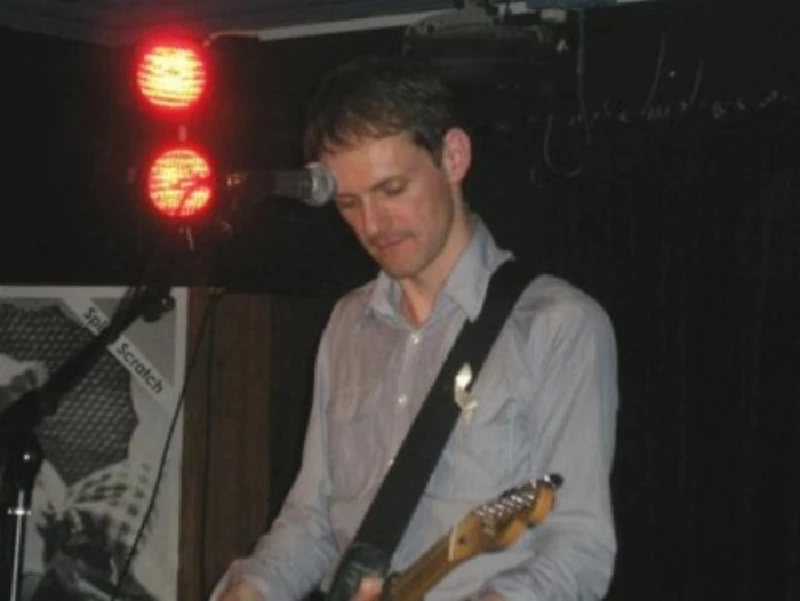
intro
At the Indietracks Festival in Derbyshire, Jamie Rowland talks to Edinburgh-based indie pop group ballboy, back for a third interview with Pennyblackmusic, about the state of radio and their first album in four years
Edinburgh’s ballboy have been playing together since 1998, and in that time have released four albums, toured the UK, USA and Europe, played countless radio sessions (including a number for the late, great John Peel) and built themselves a loyal fanbase, amongst whose numbers, I include myself. I first heard ballboy on John Peel’s show in about 2003, around the time they released their third album, 'The Sash My Father Wore and Other Stories'. I was immediately hooked by their haunting melodies and brilliant lyrics; sometimes heartbreaking, sometimes funny, always brilliant. Since then I’ve been aching to see them play live, but somehow have always managed to miss out on their shows. So, I was absolutely thrilled when I heard that they were playing at the second ever Indietracks Festival, where not only would I get to see them play live at last, but I’d also get the chance to meet and interview them about their new album, fantasy festivals, the state of radio, and much more besides. I met up with vocalist and guitarist Gordon McIntyre, bassist Nick Reynolds, drummer Gary Morgan and pianist Alexa Morrison on a docked steam train carriage just outside the main stage on day one of the festival. PB : Have you only just arrived at Indietracks? Gordon : Literally just arrived, yeah. PB : Oh, well maybe I should skip my first question…Well, no: how’re you enjoying it so far? Gary : It’s fan-tas-tic! Gordon : Well I love the location. It looks great. I haven’t heard any bands yet, but the set-up’s brilliant. PB : What bands are you enjoying at the moment, both at the festival and in general ? Gordon : Well at this festival, the Wave Pictures…who else is on my list at the moment ? The Mountain Goats, I’ve been listening to them a lot. Galaxie 500, always. Gary ; Alasdair Fraser, I’m listening to him. The Gatherers; good album. What else ? Le Coq Sportif. Alexa : Le Coq Sportif, we played with them the other night, they were dead good. PB : Would you include any of those in your influences, if you had to? Gordon : Galaxie 500, a little bit in terms of what we actually do. Gary : See, he bangs on about Galaxie 500 all the time, so they’re bound to be an influence. But we don’t talk about influences. Gordon : Not amongst ourselves. Gary : I don’t know what Gordon really likes right now, I don’t know what Nick’s listening to and I don’t know what Alexa’s listening to. Nick : The soundtrack to Grand Theft Auto is what I’m listening to at the moment. Gary : We’re not in each others pockets about it. We don’t really talk about music, quite frankly. Gordon : We haven’t ever sat down and said “this is a band, I like they’re sound, I want to include a little bit of that in it”, you know. Occasionally a song will come out, and someone will say that’s got that influence or some of that in it, and that’s fine, but… Gary : It’s just an accident. Gordon : We almost deliberately shy away from that just to see what happens. Gary : We’re not good enough to copy. Gordon : Well, that too, yeah. It takes a lot of effort to copy someone else, it’s easier to make up your own stuff. PB : This next question is really about me trying to keep things relevant to our surroundings – if time, space and death were not an issue, and you were putting together your own festival, who would you want to play? Gordon : Well, we's headline. Gary : If we all have one band to pick on that bill, who would you push for on the bill ? Gordon : Two bands. Gary : Two bands, okay. I’d like the Louis Armstrong All-Stars. I like Louis Armstrong a lot. And… Sun Ra. Sun Ra Orchestra. I’d like that. Nick : I’d have the Polyphonic Spree, just because I’d like to see them… Gordon : Festival-wise, they’d be good as well. Alexa : Yeah, they’re a good festival band. Nick : And Billy Bragg. Alexa : Damn, you nicked one of mine! I should have gone first. Gary : Swell Maps. Gordon : Hey, you’ve had your two! Gary : I’m on a roll. Alexa : I might have the Magnetic Fields, and maybe Nick Cave. Gary : Yeah, man. Bad Seeds. Alexa : Get things a bit dark, probably at about 11 or half 11 at night. Gordon : I’d have Galaxie 500, just because I could and I would, but I’d probably have Spiritualised, which surprises me a wee bit, even though it’s me saying it. Gary : (with mock intrigue) Well, it surprises me as well, Gordon. Gordon : But when I saw them they didn’t say a word and just played and it was just amazing. I can just imagine that ‘end-of-festival’ kind of thing, you know, where it’s a proper summer’s evening and it’s just getting dark and Spiritualised are playing. So that’s what I’ve got. PB : I only ask really because that’s the sort of geeky thing I’d do in my own spare time, although I’d probably work out what time each band would play as well, because I’m just that cool. Gordon : Do you make up your own bands? That’s what I do sometimes, at my imaginary festival. Punk festivals, you know. The Ballbags, or Dick Dick and the Dicks. PB : I might do that in future. Gordon : What you should do is have an extra stage at your festival, The Imaginary Stage. Alexa : Oh, we’d have to have Bearsuit at it as well! PB : Do you play at a lot of festivals? Gordon : Not nearly as many as we’d like, we’d like to play a lot more because we haven’t really played that many. We’re hopefully targeting next summer to play a lot more and do a rash of festival gigs. Gary : We’ve been quite quiet for a little while it must be said, in terms of our gigging. The is the first tour we’ve done for a little while, so this is an opportunity to sort things out and see what we want to do, and we want to do more festivals, sure, because there’s lots and lots and lots and lots and lots of them! And they’re not all big, big, big; there’s lots of little ones, which are far more interesting. Gordon : Festivals like this are great. There’s always been little festivals, but the amount of them now… Gary : These are the kinds of festivals that, as a punter, I’d like to go to. I don’t want to go to T in the Park, I’d want to go to a wee place. PB : And you get to ride on a steam train here, too. Gary : Well, there’s a fucking bonus! Gordon : And it’s not full of Neds, who are running around being arses. Gary : With machetes. Gordon : Aye, with machetes. Well, it’s early days yet. We haven’t checked out the other stages. PB : A lot of independent or lesser-known bands from Britain seem to be doing more festivals in Europe than here in the UK. Has that been the case with ballboy ? Gordon : Well, this kind of festival happens a lot more in Europe. I’ve done some acoustic ones, but we haven’t done any as a whole band. I really want to play the Amouda festival in Sweden, but haven’t been able to sort that out, ever. Gary : We need to get our shit together a bit more about that kind of thing. Gordon : We’ll pin it on next year. Gary : We all do different things as well, you know. It’s all a matter of timing. PB: You have a new album out, ‘I Worked On the Ships’. It’s been four years since your last album, and before that you were releasing a record a year. Why the big gap between the fourth album and this fifth one? Gordon : Has it been that long, really ? Well, as Gary said, there’s a lot of different things to do with timing. We left our previous record label, which took time, and then decided that we were going to do this one ourselves. That took a lot of time. We did everything. We hired a cottage in the Scottish borders, we went down and recorded it ourselves, then took it away and mixed it ourselves. In the past, we’d go in for a week, and at the end of the week the album would be finished, but we all felt that we didn’t get our input in the mixing process. In that space of time, it’s just not possible. With this record, for a few months, we were just listening to it, which is ideal really. Nick : We recorded it a year ago, so we’ve had a whole year to go through it. It was a different way of doing things. Gordon : Yeah, and involved in that there’s a lot of learning, you know; learning how to record it and mix it yourself, what we want, how to put together a record label and put things out. Alexa : And when to stop, as well. When to stop fiddling. Gordon : Yeah, because once you’ve got complete control over it, you can fiddle with it forever. Nick : There’s always something where you can think maybe I could do that, or maybe I could just change this bit. Gordon : There are people in bedrooms all over the country making electronic music who will never, ever release an album, because they’ll never, ever finish a tune. “I’ve got this tune I’ve been working on for five years.” What?! No, stop it. If you’ve got more ideas, great, make another track. There has to be an element of restraint in there. PB: So what can you say about the new album to sell it to the PennyBlackMusic readers? Gary : It’s worth a listen. And I listen to it, so it must be good. Alexa : My mum likes it. But she says it’s a lot different too. Gary : I think it’s a strong piece of work. Gordon : It is a slight change. Not a change of direction… Gary : Oh, don’t use that word! Gordon : It’s not that, it’s not that. The songs come out how they come out, and we play them several different ways before we settle on one. Gary – There’s an element of being deliberate, and there’s an element of happy fortune. PB: In regards to the songs on the album, was it a case of them being written gradually over that 4 year period, or was it more of a concentrated writing session? Gordon : I think actually these ones were written gradually over that time. The span of the songs on the record stretches quite far back, and of course there were other songs which didn’t make the cut. There’s a lot of shuffling about. Gary : We’ll get together and we’ll rehearse a bit, and then we won’t play for a while, and then we pick it up again and things have moved on. Things get stronger, or things drop out. It has been quite a slow process. Nick : Survival of the fittest. Gary : What sticks and what doesn’t. PB: I introduced a friend of mine to your music, and he liked it very much, but since then he has complained a lot to me about why clubs and radio stations play so much, in his words, “shite”, while Ballboy seem to be relatively unknown. Are you concerned about how well-known you are, or are you happy to have a loyal fanbase, no matter how big it is? Gary : We don’t worry about it. Gordon : I’ve never worried about it in the slightest. We worry about getting people to hear our music. If everyone in the country heard our record and we still had the same fanbase, I’d be happy with that. The thing that gets to me is are people getting to hear it, because we don’t know much about that kind of thing. Nick : One of the most annoying things is if we get a message from someone saying “I’ve been trying to find your album, but I can’t find it anywhere”. Gordon : That’s getting better though, now you can download the songs, on our website you can order them from us, so we’re getting better and better at that. Gary : It’s not about profile, you know. It’s who gets to hear the records. Gordon : We started this band to make music, and to get our songs out there. We never started it to get a huge, high profile, and given the choice between the two - having a high profile but having interference in what you can write, or having our kind of profile, with no interference – brilliant. It just wouldn’t work, you know. If we signed for a big record label and they said “you have to change that lyric”, we wouldn’t do it. We’d just say we’re not doing it and then we’d get kicked off again, so it’d be a very short-lived relationship. Gary : You could also put it this way; from a personal point of view, the way a band moves along a timeline, as it were, towards getting a bigger profile - I wouldn’t get to bring up my kids. There’re all these things other than making records, and I think that’s important about what we do and what we are as people in a band. People have to know that people have other lives outside of a band. Gordon ; And you lose your sense of adventure in that corporate world. Nick ; I think it takes a lot of the pleasure away from it as well. When you’re doing it to make a living there’s always that pressure behind it where you have to do what you have to do. Gary : It’s not about money, it’s about being with these people. Gordon : And all the weird and wonderful stories you bump into on tours and at shows, and the amount of times being in this band where I’ve thought that if it wasn’t for this I’d have never had that moment; never had that weird, strange, amazing, one-off moment. And you think, actually you wouldn’t get that in a bigger band. Gary – There’s no better advocacy for that. I wouldn’t want to think about where the profit was from one gig to the next, and thinking about the money. We have a time together, and the happy bi-product of that is getting to play shows – fucking great! What more can be said? PB: Well, linked to that idea of being heard, I wanted to ask you about John Peel. I first heard your songs on his show, and I think it’s fair to say that that’s where a lot of people will know you from. It’s been four years now since his death, and I was wondering whether you have noticed any impact from his passing in terms of getting yourselves heard? Nick : Well we haven’t really released anything since then, so we don’t know yet. Alexa : We’ll find out! Gordon : It’ll be interesting to see though with this album. We’ve got a guy who’s putting stuff out onto the radio and things, and doing a very good job, but it’ll be interesting to see. Because there is no John Peel. And I don’t mean a person, I mean there’s not even a show that has that…They want a show like that, but they don’t want it. It needs an actual person to get it together. Gary : The BBC isn’t in a position to let that be created. John Peel was created over a long, long time, and I don’t think they have, in terms of organisation, the ability to allow something to gestate that long anymore. Gordon : But also, the conditions for John Peel’s show were: go on and play what you want. And they could do that easy, but of course, that depends on the person they get, and the person who’d be best at it would never apply for it, and the person who applied for it, you know. It’s that whole thing where politicians should be barred from being politicians if they really want to be politicians. Gary : So in respect it remains to be seen, so I guess we put the record out without a kind of John Peel around, and see how that transpires. Gordon : I did an acoustic session for a radio station in Italy that was hosted by the Italian John Peel, and I know he was the Italian John Peel because he told me he was about 30 times. I’ve met John Peel, and he wouldn’t even say “I’m John Peel” like that. I guarantee the ‘next John Peel’ won’t be the guy going “I’m the next John Peel”. PB : Well the only show I can think of that kind of tries to follow on in a similar vein is Huw Stevens’, but even that goes out at midnight, so it’s not exactly easy to catch it. Gary : Marginalised. And that’s where John Peel would have eventually ended up, 12 til 2. Alexa : They were pushing him further and further back. Gary : They were squeezing him out. Gordon : That was something he wasn’t happy about. He didn’t like it. It was a strain that he didn’t need. They should never have done that. Gary : He was fortunate that he had the clout to do shows from home and the rest of it. The bottom line was he was being more and more marginalised about where he fitted and about how the BBC saw his role. PB : It seems funny to me that the BBC have the slogan of ‘In New Music We Trust’, but they’re playing exactly the same things you hear on every other mainstream music station; what’s selling the most records at the time. Nick : Well there’s people like, say, Jo Whiley, who’s claiming she’s a champion of new music. It makes you sick. And Zane Lowe. Gary : We went to the pictures yesterday afternoon, and watched an advert for Radio 1, and they’re trying to put across that they’re this beacon for new music and culture, and we’re thinking this is fucking so wrong, you guys. It rang really hollow. I hope they all look at it and think we look really shady in this. Really shady. PB : In regards to song writing again, how do you go about putting a song together? Gary : It’s quite simple. Gordon comes up with lyrics and a tune, and we go into the rehearsal and we’ll play it, and he’ll have a kind of idea of how he wants it to go, and then we’ll make a fucking arse of it. We play around with it - things will stick, things won’t stick. There’s an openness to it. Gordon : More and more, the lyrics come first, in terms of me in my house, before we get to practice. It used to be a kind of mixture of having a tune and lyrics that went with it, but more and more it’s either a set of lyrics that I like, or a story that then becomes lyrics that then becomes a tune, and sometimes I go to practice with a very definite idea of how the song will sound, and sometimes I go with no idea whatsoever. But, even the ones where I have a 100% idea of how it will finish up, it doesn’t always do that, because along the way, once you get other ideas in, there’s things you haven’t thought of. It’s all intuitive. It’s like, this is what I think goes, or this should happen, and it kind of goes from there. But some of the songs I like best are the ones that turn out exactly how I imagined them from the start, and some of the songs I like best are totally off the radar. There’s no way of knowing how it could progress. Once it’s in the rehearsal room, it’s not a process. Gary : Like we said earlier in the interview, we don’t have a set of musical touchstones, or influences that we will return to and go “it’s a bit like that, this is a bit like that”. We just come at it and see what comes out. I don’t know if that’s how it works for most bands, but that’s how it works for us. PB : It’s interesting asking bands about influences, because it is very rare that you will get a straight answer of “this band”, or “these people”. Gary : It’s dangerous to name influences, because influences are very, very wide. Gordon : There’s more non-musical influences than musical influences, you know. Gary : Books, movies, all sorts of things that happen to you. Gordon : People on the street. People that you see - if you see someone standing at a bus stop. Very, very occasionally, you might see someone standing at a bus stop, on their own, and there’ll be a moment where they are just unaware that anyone’s watching them, and they just relax in some way. Now that can be a multitude of things. Sometimes they can relax and you can see that they’re really sad or down-hearted or worn out. Sometimes they relax and you can see they’re at peace. And that’s the moment. That’s the moment you’re aiming for in a lot of those songs, and sometimes you get that, and if you get that moment – no matter how you do it, no matter what the story of the song is, if you can some way describe that moment, then you’ve got it, and the rest of it flows from that. So it’s things like that; it comes from watching people, and watching people interact. And yourself obviously, what you do in the world. Gary : So are you saying that we live in a musical world, but it’s not actually music that defines it ? Gordon : Yeah, I don’t think it does, because if it did there’d be no point. Gary : There, did you get that? D’you see that ? Gordon : You don’t want the bit where you say “Did you get that? Did you get that? That was fucking brilliant!” Gary : Are you censoring me? You’re censoring me! Gordon : I’m not, I’m making you look good. PB: In a way, you’ve answered this question already, but are there any other, perhaps literary sources, which influence your lyrics ? Gordon : Well, every indie-band singer/songwriter will tell you this, but it’s also true: Charles Bukowski. For specific reasons, because of what he takes out of his writing. Charles Dickens describes every single thing, Charles Bukowski says things like “the hotel corridor smells like shit”. To me that’s right, because I can imagine what that smells like. I don’t need to know that it smells like shit because someone had been sick here or peed there; it smells like shit, that’s all you need to know, and it doesn’t matter if Nick’s version of what shit smells like is different from mine. So Bukowski, for his minimalist kind of approach. Emily Dickinson – another indie-band touchstone, I’m aware – but yeah, definitely. I don’t know if you’ve ever read the stories of David Runyon, but he’s the guy who wrote the stories that ‘Guys and Dolls’ is based on. His short stories are phenomenal. they’re so twisty, turny. They’re all set in New York in the Depression of the 1930's, and they’re just brilliant stories; almost always with a kicker at the end that you weren’t expecting. Beautiful rich language. PB : On your website, you’ve been producing podcasts for your fans to download over the last year or so. Are you all involved in those? Gordon : No, that’s just me. Gary : That’s just him in his room. Sad bastard. PB : Podcasts are all over the place at the moment, but there aren’t many bands, to my knowledge, that produce them. What made you decide to do your own ? Gordon – I partly did it because I could. it was learning the new technology. And so I did one and I got some feedback, so then I did another, and got more feedback, and it’s gone way beyond what I was expecting. Gary : And I guess because we’ve been quite quiet for a period, the podcasts have been little flags up saying “here’s a new song, here’s stuff we’ve been doing, here’s stuff I’ve been thinking about”. Just to keep things fresh on the website. Not that it’s been that contrived, but it’s kind of worked out like that. Gordon : I had no idea they were going to be as brilliant as they are. PB : On the last podcast, you mentioned that you recorded a special version of your song ‘Where do the Nights of Sleep Go’ for a movie soundtrack, and I was just wondering how that came about, and if it’s still going ahead ? Gordon : It has happened. Nick : It’s out. Gary : Straight to video! Nick : Straight to DVD. Gordon : We met a mad, hairy American guy when we were on tour, in Boston. While we were chatting to him he told us he was mega-rich. Gary : “Hey, I’m mega-rich, see me?” Gordon : He told us he started this website. It went totally huge, and some guy bought it off him just before the dot com crash. He says, “now I’ve got all this money and I don’t know what the fuck to do, I just fly around seeing bands. I’m going to do something, but I don’t know what!” So anyway, he ended up in Los Angeles, and one of his pals is the director of the film. And because he’d been saying “listen to this, listen to this!” as people do, this director emailed me to say would you be interested in having one of your songs on the film, and I said yes. So he emailed me again, and said we’ve got this prom scene, can you rework this song for the scene, and we were like, yeah, absolutely, so we did that. One of the ballboy fans said it was a pile of shite and we totally ruined it! But it was a different way of working and a different thing to do. I mean, I like the original – I think it’s a better song – but I just like that different way of working and trying to do something different. PB: Did they send you the scene before you reworked the song ? Gordon : He sent me the scene, and then it was like a back-and-forth. I would send him something, then he’d say more this, or less that. He wanted kind of heavy guitars, but not a rock song, so he wanted that kind of sugary, heavy, distorted guitar in the background, and eventually we got to that. Phil Spector was a big kind of touching point, I was saying do you want more kind of Phil Spector drums and things, and that’s the way it went. PB : Just one last question: now that ‘I Worked on the Ships’ has been released, what are your plans for the rest of the year and beyond? Gordon : Take another 4 years off? Plug the record a bit, get it out, see what happens. Maybe do some radio sessions and start doing that whole thing again. Gary : See what happens, yeah. We haven’t really had the conversation beyond getting it out. PB : Thank you.
Picture Gallery:-
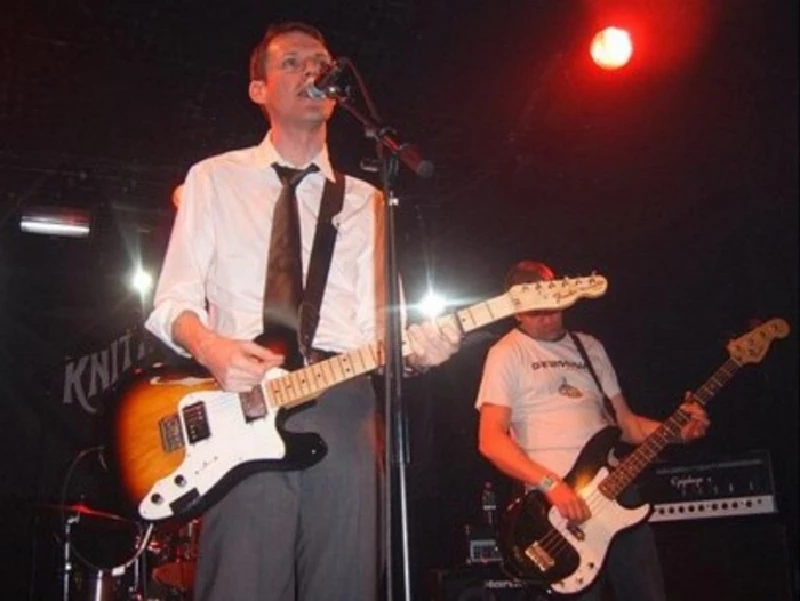
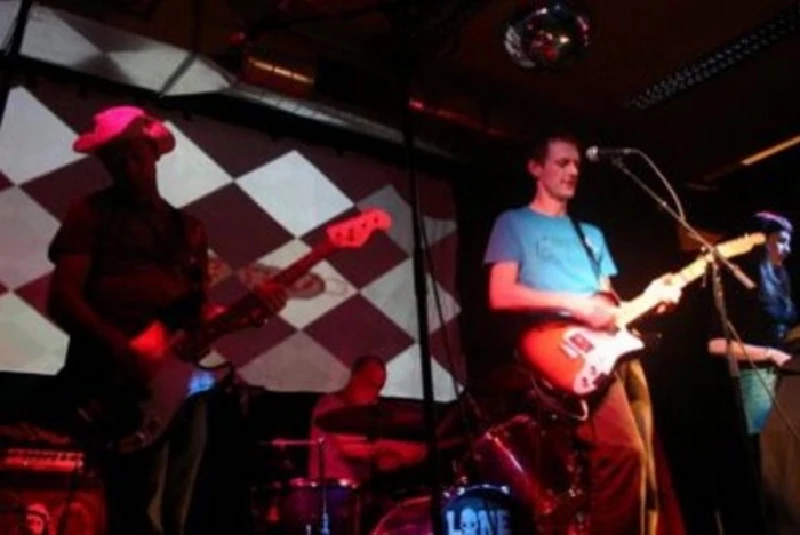
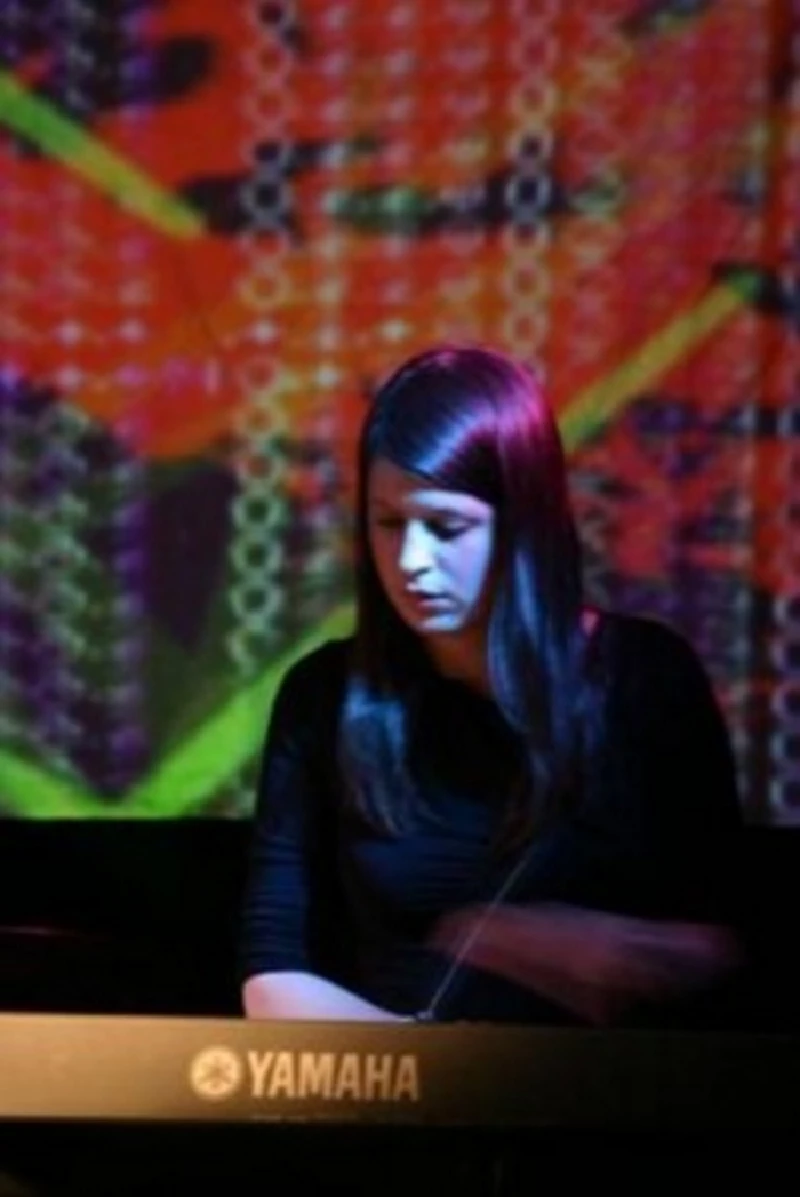
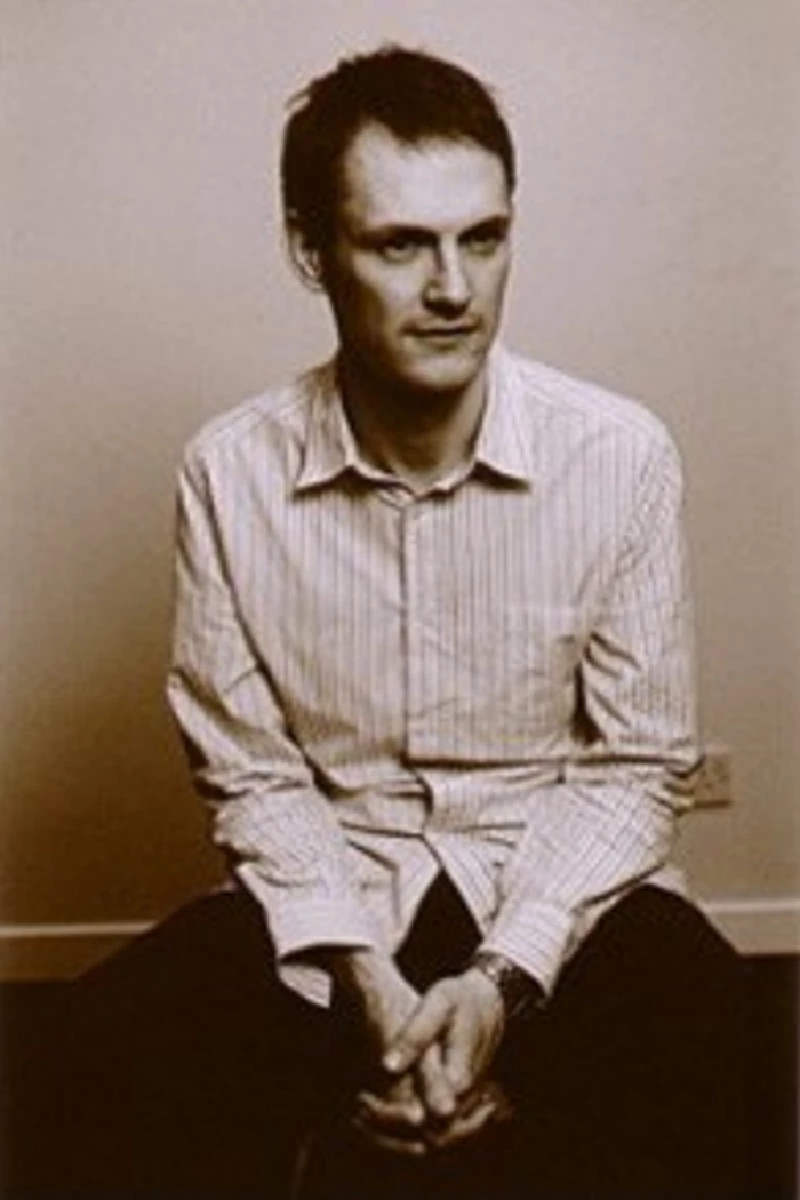
interviews |
|
Interview (2002) |
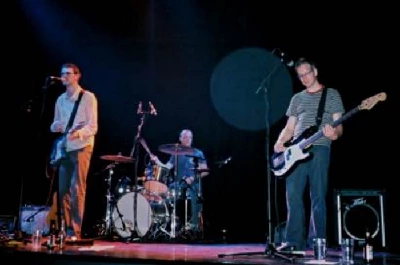
|
| The Scottish group ballboy have just released their first “proper” album, 'A Guide To The Daylight Hours'. Gordon McIntyre, the frontman with the increasingly popular indiepop group, talks to Tommy Gunnarsson about it, critics, and touring America |
| Interview (2002) |
live reviews |
|
Lokal Bar, Vaxjo, Sweden, 12/4/2003 |
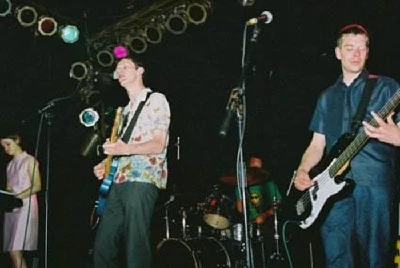
|
| Tommy Gunnarsson waited for more than three years for ballboy to come to Sweden, but finds it has been worth the long wait |
reviews |
|
All The Records On The Radio Are Shite (2002) |
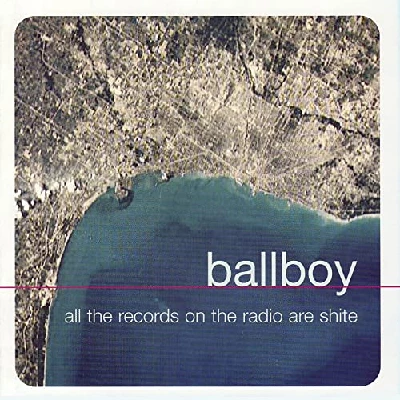
|
| Fourth EP from Edinburgh indiepop stars, which ,while it is not able to live up to the very high expectaions of its predecessors, still makes essential listening |
| I Hate Scotland (2001) |
| Club Anthems 2001 (2001) |
| Girls Are Better Than Boys (2001) |
most viewed articles
current edition
Carl Ewens - David Bowie 1964 to 1982 On Track: Every Album, Every SongArmory Show - Interview with Richard Jobson
John McKay - Interview
Colin Blunstone - Thalia Hall, Chicago, 16/7/2025
Bathers - Photoscapes 1
Billie Eilish - O2 Arena, London, 10/7/2025
Loft - Interview
Visor Fest - Valencia, Spain, 26/9/2025...27/9/2025
Sir Tim Rice - Interview
Robert Forster - Interview
previous editions
Manic Street Preachers - (Gig of a Lifetime) Millennium Stadium, Cardiff, December 1999Heavenly - P.U.N.K. Girl EP
Beautiful South - Ten Songs That Made Me Love...
Peter Perrett - In Dreams Begin Responsibilities Interview Part One
Boomtown Rats - Ten Songs That Made Me Love....
Oasis - Oasis, Earl's Court, London, 1995
Coldplay - Wembley Arena. London, 16/8/2022
Prolapse - Interview
Trudie Myerscough-Harris - Interview
Pixies - Ten Songs That Made Me Love...
most viewed reviews
current edition
Davey Woodward - Mumbo in the JumboSick Man of Europe - The Sick Man of Europe
Lucy Spraggan - Other Sides of the Moon
Amy Macdonald - Is This What You've Been Waiting For?
Suzanne Vega - Flying With Angels
Blueboy - 2
Bush - I Beat Loneliness
Phew, Erika Kobayashi,, Dieter Moebius - Radium Girls
Alice Cooper - The Revenge of Alice Cooper
Cynthia Erivo - I Forgive You
Pennyblackmusic Regular Contributors
Adrian Janes
Amanda J. Window
Andrew Twambley
Anthony Dhanendran
Benjamin Howarth
Cila Warncke
Daniel Cressey
Darren Aston
Dastardly
Dave Goodwin
Denzil Watson
Dominic B. Simpson
Eoghan Lyng
Fiona Hutchings
Harry Sherriff
Helen Tipping
Jamie Rowland
John Clarkson
Julie Cruickshank
Kimberly Bright
Lisa Torem
Maarten Schiethart